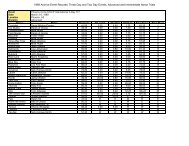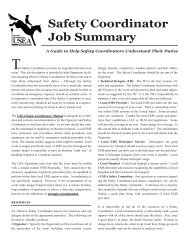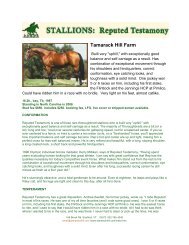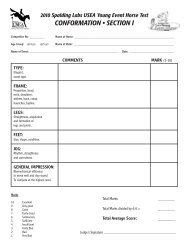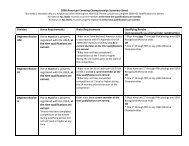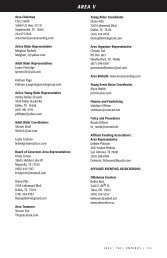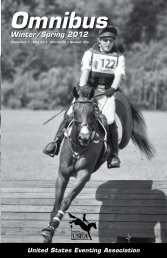Omnibus - Summer 2011 (PDF) - United States Eventing Association
Omnibus - Summer 2011 (PDF) - United States Eventing Association
Omnibus - Summer 2011 (PDF) - United States Eventing Association
Create successful ePaper yourself
Turn your PDF publications into a flip-book with our unique Google optimized e-Paper software.
training leVel dressage tests<br />
u.S. eQueStRIAN FedeRAtION 2010 tRAINING eVeNtING teSt A<br />
Conditions: 1) Bridle: A plain snaffle bridle, made entirely of leather or leather like material, with either a regular cavesson,<br />
a dropped noseband, a flash noseband or crossed noseband. For drawings of permitted bits and nosebands please<br />
see Appendix 4. 2) Arena: 20m x 40m (small) 3) time: Approximately 4:00<br />
TEST DIRECTIVES POINTS<br />
1. A Enter working trot. Straightness on center line quality of trot. 10<br />
C Track left Quality of turn at C.<br />
2. E Circle left 15 meters Quality of trot, roundness and size of circle. 10<br />
3. FXH Lengthen stride<br />
H Working trot.<br />
Lengthening of frame and stride.<br />
10<br />
4. B Circle right 15 meters Quality of trot, roundness and size of circle.<br />
working trot.<br />
5. KXM Lengthen strides in trot. Lengthening of frame and stride.<br />
M Working trot.<br />
6. C Circle left 20 meters letting Quality of stretch over back, forward<br />
the horse stretch forward and down. and downward into a light contact<br />
while maintaining balance and quality of trot.<br />
C Working trot Transition to working trot.<br />
7. H-E Medium walk. Balance and smoothness of transition.<br />
8. E-F Free walk. Quality of free walk and straightness.<br />
F-A Medium walk. Quality of medium walk and transition.<br />
9. A Working trot. Balance and quality of transition.<br />
K Working canter right lead. Quality of trot and canter.<br />
10. E Circle right 15 meters Quality of canter, roundness and size of circle.<br />
working canter.<br />
11. M to F Lengthen stride in the canter. The lengthening of frame and stride<br />
F Working canter.<br />
regularity, uphill balance transition.<br />
12. KXM Change rein. Straightness quality of canter and trot,<br />
X Working trot. balance and smoothness of transition.<br />
13. M Working canter left lead. Calmness and smoothness of depart .<br />
14. E Circle left 15 meters Quality of canter, roundness and size<br />
working canter. of circle.<br />
15. K Working trot. Smoothness of transition.<br />
16. A Down center line Quality of turn at A, straightness.<br />
17. X Halt, salute. Quality of halt and immobility.<br />
Leave arena at walk at A. All trot work may be performed rising or sitting unless stated otherwise.<br />
COLLECTIVE MARKS:<br />
Gaits Freedom and regularity.<br />
10<br />
Impulsion<br />
Desire to move forward. Elasticity of the steps. Suppleness<br />
of the back and engagement of the hind quarters<br />
10<br />
Submission Acceptance of the bridle. Attention and confidence.<br />
Harmony. Lightness of the forehand. Ease of movements.<br />
10<br />
Rider Position and seat. Correctness and effect of the aids. 10<br />
Effective Date: December 1, 2009. Reprinted with permission of the U.S. Equestrian Federation.<br />
©2009 <strong>United</strong> <strong>States</strong> Equestrian Federation®. All Rights Reserved. Reproduction without permission prohibited by law.<br />
10<br />
10<br />
10<br />
10<br />
10 x 2<br />
10<br />
10<br />
10<br />
10<br />
10<br />
10<br />
10<br />
10<br />
10<br />
Total possible points: 220







